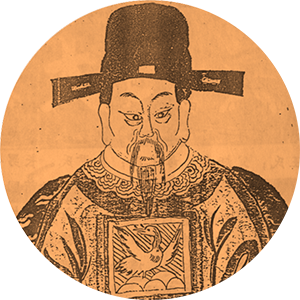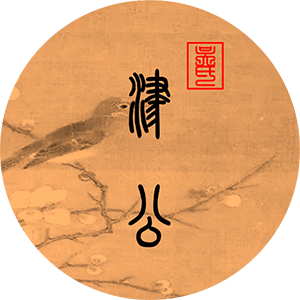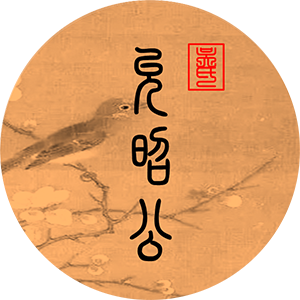
Wu Shilai (1527-1590), courtesy name Weixiu, self-titled Wuzhai, was a native of Houren village. By the time he was seven years old, he had already demonstrated exceptional talent and understanding, and he could recite the scriptures immediately after he read it. Once, as a wildfire was burning in Ping Shan, a relative called on Shilai to try to match an antithetical couplet, “A tiny spark can burn a thousand-foot mountain”. He was amazed when Wu Shilai quickly chanted in response, “A single grain can grow to fill more than a thousand hectares of farmland.” At the age of ten, he could write poetry and was widely described as a prodigy. Later, he took part in the county and provincial examinations and was ranked first in both.
In the 28th year of Jiajing (1549), he and his uncle Wu Bingshu were both successful in the same provincial examination and in the following year, Wu Bingshu (courtesy name Chaozheng, self-titled Jianping, his highest rank is Deputy Surveillance Commissioner of Yunnan) attained Jinshi degree, but Wu Shilai failed. When he returned from the examination, he went straight to the ancient temple of Jingxing Rock(景星岩), 20 li from his home, where he studied unrelentingly, not returning home for two years. When his father went to visit him, he saw that the four walls of his room were spotted with blood and he cried out, “My son has worked his heart out!” He urged him to return home.
Eventually Wu Shilai attained Jinshi degree in the 32nd year of Jiajing and served as the magistrate of Songjiang(松江推官). In the 33rd year, the Japanese invaded Songjiang. The people fled into the city, where the pursuing Japanese killed many of them indiscriminately. Wu Shilai had ordered the opening of the city gates to allow these tens of thousands of refugees to enter. He also led hundreds of crossbowmen against the enemy, killing thousands of them. When he was promoted to the Supervising Censor(给事中) of the Ministry of Justice, he impeached Xu Lun, the Minister of War(兵部尚书), Yang Shun, the Governor(总督) of Xuanda, and Lu Kai, the Censor-in-Chief(御史), and other members of Yan Song's party (Yan Song 严嵩1480–1567, courtesy name: Weizhong (惟中), pseudonym: Jiexi (介溪), was a corrupt Chinese politician in the Ming Dynasty, who dominated the Ming government for two decades as Grand Secretary (Prime Minister) during the reign of the Jiajing Emperor. He and his son Yan Shifan dominated court politics with the tacit consent of the fatuous monarch who shirked his responsibilities as emperor and devoted much of his time to sensual pleasures and Taoist practices. Under Yan Song, the nation fell into an era of moral decadence and corruption, where righteous officers were sidelined and the Ming national strength fell rapidly). Yan Song hated Wu Shilai. He attempted and failed to have him sent on a mission to the Ryukyu Islands. However, in the 7th year of Jiajing (1558), Wu Shilai was, once again, publicly criticized by Yan Song and this time, he was banished to the frontier in Hengzhou (now Hengxian, Guangxi) for ten years. His father and his father-in-law went to visit him there, but tragically, they both died from plague. In Hengzhou, rather than complain, Wu Shilai read widely, built the Wuzhai Academy, lectured day and night, practised and cultivated his accomplishments and explored the local culture. In the first year of the Longqing reign (1567), he returned to the capital as supervising censor of the Ministry of Works(工部给事中), where he planned a number of river management projects to the great benefit of the people. He also recommended Tan Lun, Yu Dayou and Qi Jiguang to Emperor Mu Zong, who accepted his recommendation that they should be employed in the town of Jizhou to train the border militia and in so doing, the towns are free of recruitment. He also impeached Liu Bingren, the Commander of the Imperial Court(佥都御史), and gained in the court a reputation for shocking straight-talking. In the second year of the Longqing reign, he was appointed as governor of Guangdong, but was then himself impeached and dismissed because of his abusing 59 of his cronies before leaving for his post . He returned to his home town where he remained for 16 years.
In the twelfth year of the Wanli reign (1584), he was appointed Deputy Surveillance Commissioner (按察副使)of Hu-Guang, and was immediately promoted to the position of Left Minister of Transmission(左通政使). Soon after, he became chief of the Grand Court(大理事卿), and served successively as assistant minister (侍郎)at the Ministries of Justice and Revenue. In the fifteenth year of the reign, he was appointed to the post of the Left Censor-in-Chief(左都御史), standing up to the court with bold and confident directness. He impeached Duke Chengyi(诚意伯) Liu Shiyan, and passed sentence on his followers for violating the law. In the fifth month of the eighteenth year of Wanli (1590), he begged to be allowed to return home, but died at the age of 64 before he was able to leave Beijing. He was awarded the posthumous name Zhong Ge and the title of Grand Tutor to crown prince. He was buried in Dalin, Hengxi.
家谱传记
地方志
国史记载



